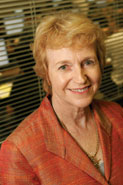Books, e-zones and beyond Google
Books, e-zones and beyond Google McGill University
User Tools (skip):
Entre nous with Janine Schmidt, Trenholme Director of Libraries
Books, e-zones and beyond Google
Since arriving in Montreal on February 1, Janine Schmidt has been busy as the Trenholme Director of Libraries, responsible for the McGill library system and initiating a number of important changes. Previously she held a similar post at the University of Queensland in Brisbane, Australia.

Janine Schmidt outside McLennan Library’s 24-hour study space
Owen Egan
Libraries have been in a state of flux in recent years, especially with the information explosion. How have libraries changed?
I'm interested by how libraries are transforming. Some people use the term "hybrid library" to refer to the combination of computer content and print, but I like "pop" and "wow" - for "print on paper" and "words on the web." Libraries have always collected forms of communication, whether they were manuscripts, papyrus rolls, stone tablets or books. Then we've organized these materials, which today we do through our website. And finally we make sure people can find what they need. All three of these tasks - collecting, organizing and making available - are important, but the last one interests me most.
With so many resources available, and such a glut of information, how do you make the best information easier to find?
First, we have to know our clientele, which means we must recognize and support all types of learning. Most of our education is "just-in-case" - for instance, although I don't think I've ever used a quadratic equation in my life, I learned it in case I need it. There is also "just-in-time" education: consider technology skills, which we usually acquire only as we need them. And then there is "just-for-you" - the education you need for your specific professional work or interests. Couple these with the changes in pedagogy occurring with the rise of "discovery learning," we need to structure our resources appropriately to respond to that.
How are these demands reflected in practice?
We have just launched a new McGill Libraries website, which should be easier to follow. We're restructuring some of our search strategies so they look more like Google, which students are familiar with. The new site also has a very good online reference shelf that tells you which encyclopedias are online, as well as a vast array of access to article indexes and databases that will direct students and faculty members to quality information.
We have journal articles available online, through Find-It@mcgill, established last year. We currently have 9,000 print journals, but, depending how you count, we have close to 25-30,000 electronic journals. We will also be creating "E-Scholarship at McGill," which will provide an archive of published papers produced by McGill faculty. We're constantly adapting and trying to improve the underpinning of our online services, making them more transparent to the user. Basically, we want to reduce the number of "clicks" the users need to go through to get information.
But, while a lot of young people are quite good at computer games, they are not so good at finding information, so we're running a course called "Beyond Google" in which we teach students how to use our structured academic databases. Overall we're strengthening our information skills program, which we've run for several years, and are working in partnership with different faculties to provide assistance to students.
The Library is also a physical entity - or many of them. What are the plans for the physical sites?
There is lots to be done on the actual physical resources, although this can be expensive. We're expanding the "e-zones" in McLennan-Redpath, and we have just integrated the collections of Blacker-Wood biology library into the Life Sciences - formerly Health Sciences - Library in the McIntyre building. The Blacker-Wood space can now be renovated to have an e-zone with more computers, as well as more group study areas - another thing students really want.
We need much more flexible working spaces because students work in groups around computers. Libraries have had a fixation about silence and there are still plenty of areas where people can find quiet spaces, but most people under 25 cannot work without noise. They're always talking about problems and issues they are researching, and we need to facilitate that discussion in ways that make sense.
But the physical library won't be vanishing into cyberspace anytime soon?
Not a chance. The book itself is still very important - Amazon is certainly selling lots of them! - so we are installing compact shelving to hold materials that might otherwise be put in storage, where they would be difficult to access. And people use these resources. Last year the library system had 3.3 million users, so developing our facilities remains very important. We have long opening hours, 84 hours most weeks, and 24 hours a day during the exam period. Last spring, CBC Radio broadcast at 3 am from McLennan - the place was humming. And there are many nights when I go home and the rest of the university is completely deserted, but it's incredibly busy here.
You must be incredibly busy too, with all these changes...
Sometimes people say to me, "Why are you in such a hurry?" And I always think, "Am I in a hurry? I thought I was quite slow." But I do feel we have an enormous obligation to serve our community. We've taken it as our slogan: Innovation, Information, Service. You can see it on our website.

